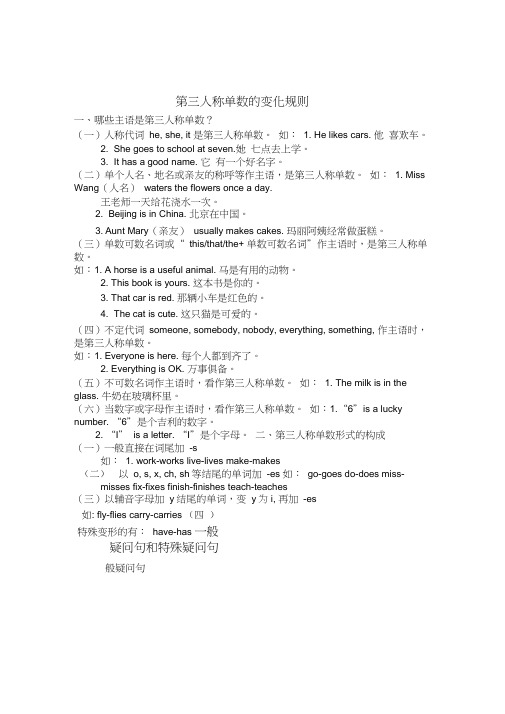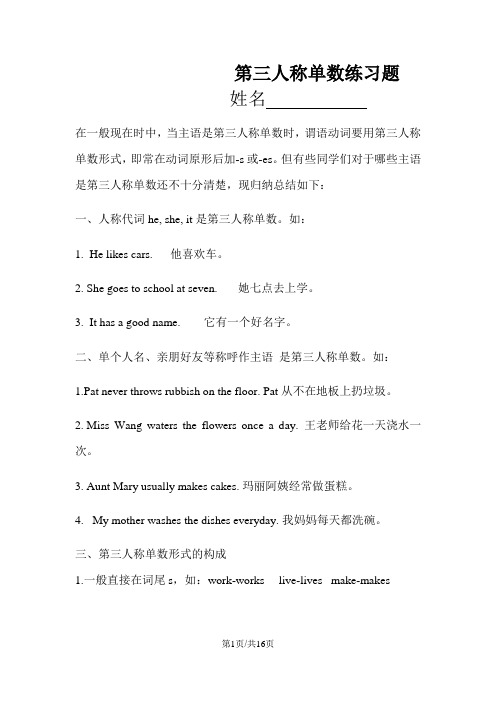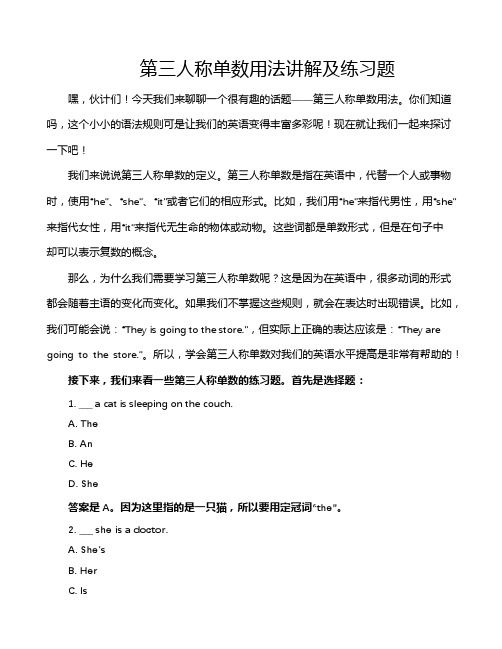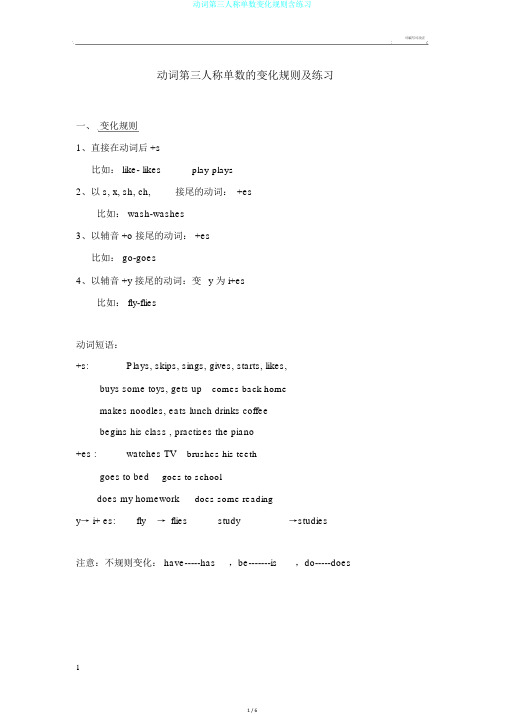英语第三人称单数总结晕练习
第三人称单数练习题及答案

第三人称单数练习题及答案英语中的第三人称单数指的是“他/她/它”。
在使用动词时,第三人称单数的形式与其他人称有所不同。
学好第三人称单数的用法对于英语学习者来说是非常重要的,因为它在英语中经常被使用。
在本文中,我们将提供一些练习题和各种情况下的答案,以帮助学习者更好地掌握第三人称单数的语法规则。
练习题一:将以下短语改写为第三人称单数形式。
1. I eat breakfast at 7 am.2. She drinks coffee every morning.3. He doesn't like vegetables.4. They watch TV in the evening.5. We play football on Saturdays.答案一:1. He eats breakfast at 7 am.2. She drinks coffee every morning.3. He doesn't like vegetables.4. They watch TV in the evening.5. They play football on Saturdays.练习题二:在下面填入正确的动词形式。
1. The cat ___ (sleep) on the sofa.2. The boy ___ (walk) to school every day.3. The dog ___ (bark) at the mailman.4. The flowers ___ (smell) wonderful.5. The bird ___ (sing) in the tree.答案二:1. The cat sleeps on the sofa.2. The boy walks to school every day.3. The dog barks at the mailman.4. The flowers smell wonderful.5. The bird sings in the tree.练习题三:在下面填入正确的动词形式。
小学英语第三人称单数专项练习含答案

小学英语第三人称单数专项练习(含答案)一.请用have或has填空。
1. I a nice picture.2. He a good friend.3. They some kites.4. We some flowers.5. She a duck.6. My father a new bike.7. Her mother a vase.8. Our teacher an English book.9. Our teachers a basketball.10. Their parents some story books.11. Nancy many skirts.12. David some jackets.13. My friends a football.14. What do you ?15. What does Mike?一.Do还是Does我来选。
1.[Do/Does]he watch TV at night? Yes he does.2.[Do/Does]you go to school every day? No, I don't.3.[Do/Does]Jack and Peter like apples?4.[Do/Does]Tina go swimming on Sunday?5.[Do/Does]they play football? Yes, they ―[do/does].6.[Do/Does] we have a good teacher? Yes, we [do/does].7.[Do/Does] they jump rope ? No, they ―[do not/does not].8.[Do/Does]your dog walk in the zoo?9.[Do/Does]I have a big nose? No, you[do not/does not].10.[Do/Does]your cats eat fish? Yes, they.[do/does].11.[Do/Does]their mothers go shopping? No, they[do not/does not].12.I —[do not/ does not] speak Japanese. [Do/Does]you speak Japanese?二.请用动词的适当形式填空。
(完整版)动词单数第三人称练习题

第三人称单数的变化规则一、哪些主语是第三人称单数?(一)人称代词he, she, it 是第三人称单数。
如: 1. He likes cars. 他喜欢车。
2. She goes to school at seven.她七点去上学。
3. It has a good name. 它有一个好名字。
(二)单个人名、地名或亲友的称呼等作主语,是第三人称单数。
如: 1. Miss Wang(人名)waters the flowers once a day.王老师一天给花浇水一次。
2. Beijing is in China. 北京在中国。
3. Aunt Mary(亲友)usually makes cakes. 玛丽阿姨经常做蛋糕。
(三)单数可数名词或“ this/that/the+ 单数可数名词”作主语时,是第三人称单数。
如:1. A horse is a useful animal. 马是有用的动物。
2. This book is yours. 这本书是你的。
3. That car is red. 那辆小车是红色的。
4. The cat is cute. 这只猫是可爱的。
(四)不定代词someone, somebody, nobody, everything, something, 作主语时,是第三人称单数。
如:1. Everyone is here. 每个人都到齐了。
2. Everything is OK. 万事俱备。
(五)不可数名词作主语时,看作第三人称单数。
如: 1. The milk is in the glass. 牛奶在玻璃杯里。
(六)当数字或字母作主语时,看作第三人称单数。
如:1.“6”is a lucky number. “6”是个吉利的数字。
2. “I” is a letter. “I”是个字母。
二、第三人称单数形式的构成(一)一般直接在词尾加-s如: 1. work-works live-lives make-makes(二)以o, s, x, ch, sh等结尾的单词加-es 如:go-goes do-does miss-misses fix-fixes finish-finishes teach-teaches(三)以辅音字母加y结尾的单词,变y为i, 再加-es如: fly-flies carry-carries (四)特殊变形的有:have-has 一般疑问句和特殊疑问句般疑问句be 动词(am, is are)肯定:Yes, 主语+引导词引导词can/will/should 等情态动词答语do/does/did 助动词否定:No, 主语+引导词+not 二、特殊疑问句( 即由特殊疑问词引导的疑问句)特殊疑问词有:when, where, who, what, whose, why, howbe动词(am, is are)特殊疑问词+ can/will/should 等情态动词+ 主语+ 谓语+ 其他do/does/did助动词改写否定句型be动词+ notcan/will/should 等情态动词+ not 主语+ do/does/did + not + 谓语动词感叹句的表述What + a/an + 形容词+ 名词例:What an interesting film!How + 形容词+ 主语+ 谓语例:How interesting the film is!补充知识点动词原形如:buy(买)1、be going to + 地点如:the park打算... 时间如:on Monday2、want to + 动词原形表示“想要...”3、在 . 转弯用介词“ at”, 如turn left at.../turn right at4、like + V-ing, 如:He likes playing basketball.5、by + 交通工具,表示交通方式。
中考英语复习 第三人称单数练习 (答案不全)

第三人称单数练习题姓名在一般现在时中,当主语是第三人称单数时,谓语动词要用第三人称单数形式,即常在动词原形后加-s或-es。
但有些同学们对于哪些主语是第三人称单数还不十分清楚,现归纳总结如下:一、人称代词he, she, it是第三人称单数。
如:1. He likes cars. 他喜欢车。
2. She goes to school at seven. 她七点去上学。
3. It has a good name. 它有一个好名字。
二、单个人名、亲朋好友等称呼作主语是第三人称单数。
如:1.Pat never throws rubbish on the floor. Pat从不在地板上扔垃圾。
2. Miss Wang waters the flowers once a day. 王老师给花一天浇水一次。
3. Aunt Mary usually makes cakes. 玛丽阿姨经常做蛋糕。
4. My mother washes the dishes everyday. 我妈妈每天都洗碗。
三、第三人称单数形式的构成1.一般直接在词尾s,如:work-works live-lives make-makes2.以s, x, ch, sh, o等结尾的单词加es , 如:miss-misses fix-fixes finish-finishes teach-teaches go-goes do-doe s3. 特殊变形的有:have-has四、问句:问句中遇到第三人称单数时,需要用助动词does, 动词变为原形。
What does she like?When does he brush his teeth?How often does your sister comb her hair?练习一、将括号里动词的适当形式填入横线上。
1. I ________ in the corridors. (walk)2.He _________ in the corridors. (run)3.She ___________ her face once a day. (wash)4.They ____________ their teeth once a day. (brush)5. You ___________ up your clothes once a day. (hang)6. We ____________ our home work once a day. (finish)7. He ____________ rubbish in the classroom. (throw)8. She _____________ rubbish on the floor. (throw)9. I _____________ rubbish in the bin. (throw)10. They ___________ the table once a day. (set)11. Peter never _________ in the corridors. (run)12. Mary usually _________ the table. (set)13. Pat and Ken _________ the plants in the morning. (water)14. The boy __________ his hair once a day. (comb)15. Miss Cheng _________ TV at home. (watch)16.My sister __________ his schoolbag once a day. (pack)17.My mother _________ dinner for me. (cook)18. My parents _________ the house at Chinese New Year. (clean)19. My teachers _________ us some gifts. (give)20. My friends _________ the table with me. (set)练习二、选择正确的单词填到括号里。
(完整版)第三人称单数专项练习

不规则变化:do --- does have ------ has 在一般现在时中,当主语是第三人称单数时,谓语动词要用第三人称单数形式,即常在动词原形后加-s或-es。
但有些同学们对于哪些主语是第三人称单数还不十分清楚,现归纳总结如下:一、人称代词he, she, it 是第三人称单数。
如:He likes watching TV. 他喜欢看电视。
She has lunch at twelve. 她十二点吃午餐。
It looks like a cat. 它看起来像只猫。
二、单个人名、地名或称呼作主语;是第三人称单数。
如:①Han Mei looks like her mother. 韩梅看起来像她的母亲。
②Beijing is in China. 北京在中国。
③Uncle Wang often makes cakes. 王叔叔经常做蛋糕。
三、单数可数名词或"this / that / the+ 单数可数名词"作主语时,是第三人称单数。
如:① A horse is a useful animal. 马是有用的动物。
②This book is yours. 这本书是你的。
③That car is red. 那辆小汽车是红色的。
④The cat is Lucy's. 这只猫是露茜的。
四、不定代词someone, somebody, nobody, everything, something 等及指示代词this, that 作主语时,是第三人称单数。
如:①Everyone is here. 大家到齐了。
②There is something wrong with the watch. 这块手表有毛病。
③This is a pen. 这是一支钢笔。
④That is an eraser. 那是一块橡皮擦。
五、不可数名词作主语时为第三人称单数。
如:①The milk is in the glass. 牛奶在玻璃杯里。
第三人称单数用法讲解及练习题

第三人称单数用法讲解及练习题嘿,伙计们!今天我们来聊聊一个很有趣的话题——第三人称单数用法。
你们知道吗,这个小小的语法规则可是让我们的英语变得丰富多彩呢!现在就让我们一起来探讨一下吧!我们来说说第三人称单数的定义。
第三人称单数是指在英语中,代替一个人或事物时,使用“he”、“she”、“it”或者它们的相应形式。
比如,我们用“he”来指代男性,用“she”来指代女性,用“it”来指代无生命的物体或动物。
这些词都是单数形式,但是在句子中却可以表示复数的概念。
那么,为什么我们需要学习第三人称单数呢?这是因为在英语中,很多动词的形式都会随着主语的变化而变化。
如果我们不掌握这些规则,就会在表达时出现错误。
比如,我们可能会说:“They is going to the store.”,但实际上正确的表达应该是:“They are going to the store.”。
所以,学会第三人称单数对我们的英语水平提高是非常有帮助的!接下来,我们来看一些第三人称单数的练习题。
首先是选择题:1. ___ a cat is sleeping on the couch.A. TheB. AnC. HeD. She答案是A。
因为这里指的是一只猫,所以要用定冠词“the”。
2. ___ she is a doctor.A. She'sB. HerC. IsD. He's答案是A。
因为这里要表达的是她的职业,所以要用缩写形式“she's”。
3. My sister and ___ brother like to play video games.A. heB. hisC. himD. they答案是A。
因为这里要表达的是我的兄弟姐妹,所以要用主格代词“my sister and ____ brother”。
好啦,练习题做完了,下面我们来举几个例子,看看第三人称单数在实际运用中的表现吧!例1:My friend and her dog are going on vacation tomorrow.(我的朋友和她的小狗明天要去度假。
第三人称单数 超详细带练习题

• 含义: • 在一般现在时或进行时的情况下,当主语
是第三人称单数的时候,谓语动词要有所 改变,一般是加-s,也有特殊情况。 eg. She likes apples. • He is happy to attend the meeting. • Mary plans to swim this afternoon. • My mother asks me to help her.
buy food fly study come back home
________ food
________ _______
第三人称单数__超__详_细_带__练back home
习题
一.用所给单词的适当形式填空 1. I usually ____ (go) running for half an hour at the
第三人称单数 超详细带练 习题
do exercise
The rat
第三人称e单x数er超ci详s细e 带e练veryday. 习题
swim
swims
She
after school.
第三人称单数 超详细带练 习题
read
reads
He
books everyday.
第三人称单数 超详细带练 习题
play football
Nobody
in the classroom.
第三人称单数 超详细带练
习题
There something wrong with the watch.
这块手表有毛病。
第三人称单数 超详细带练 习题
六. 不可数名词作主语时为第三人称单数。
The milk
in the glass.
动词第三人称单数变化规则含练习

可编写可改正动词第三人称单数的变化规则及练习一、变化规则1、直接在动词后 +s比如: like- likes play-plays2、以 s, x, sh, ch,接尾的动词:+es比如: wash-washes3、以辅音 +o 接尾的动词: +es比如: go-goes4、以辅音 +y 接尾的动词:变y 为 i+es比如: fly-flies动词短语:+s:Plays, skips, sings, gives, starts, likes,buys some toys, gets up comes back homemakes noodles, eats lunch drinks coffeebegins his class , practises the piano+es :watches TV brushes his teethgoes to bed goes to schooldoes my homework does some readingy→ i+ es:fly→ flies study→studies注意:不规则变化: have-----has,be-------is,do-----does可编写可改正写出以下动词的第三人称单数drink ________ go _______ stay ________ make ________look _________ have_______ pass_______carry ____come________watch______ plant_______ fly ________study_______ brush________ do_________teach_______二、请看下边两组句子,注意划分他们的共同点和不一样点。
I go to school every day.I don't go to school every day.He goes to school every day.He doesn't go to school every day.Do you go to school every dayYes, I do. (No, I don't)Does he go to school every dayYes, he does. (No, he doesn't)注:1)第三人称单数用了does后边就不用动词的s 形式了 , 而用动词原形 . 。
- 1、下载文档前请自行甄别文档内容的完整性,平台不提供额外的编辑、内容补充、找答案等附加服务。
- 2、"仅部分预览"的文档,不可在线预览部分如存在完整性等问题,可反馈申请退款(可完整预览的文档不适用该条件!)。
- 3、如文档侵犯您的权益,请联系客服反馈,我们会尽快为您处理(人工客服工作时间:9:00-18:30)。
动词的第三人称单数形式
一、动词的第三人称单数形式规律如下:
1、多数在动词后加s
play—play s like—like s read-read s sing-sing s dance-dance s cook- cook s look- look s
2、以s,x,sh,ch,o结尾的动词加es
go—go es wash—wash es watch-watch es catch-catch es do- do es
3、以辅音字母加y结尾,把y改i再加es
fly—fl ies study—stud ies try-tr ies
特别注意:以y 结尾的动词变化,看清楚y前面的那个字母是元音还是辅音?辅音+y的,要改y,例如carry carr ies; 元音+y 的,不改y,例如play play s.
4、动词have 的第三人称单数形式是has,这是一个不规则的变化,我们经常会遇到。
5、含有动词第三人称单数的句子,在变否定句时要在动词前加doesn’t;变疑问句时要在主语前加助
动词does。
这时句子的谓语动词改为原形。
如:
Alice usually plays in the park.
Alice doesn’t usually plays in the park.
Does Alice usually plays in the park?
Where does Alice usually play?
二、写出下列动词的正确形式:(经常做的规律)
1、I (go) to school at seven in the morning.
2. Mike ( do) his homework at eight in the evening.
3. His father often ( read) books in the library on Saturday.
4.My mother usually (watch) TV plays at home.
5. My cousin sometimes (play ) cards with me.
6. you often (study ) after school ?Yes , I do.
7. Mike and Tom usually (fly ) kites on Sunday.
8. They (go) to school by bus every day.
9. She (go ) to school by bus every day.
10.We usually (listen ) to the radio in the morning.
11. He usually (listen ) to the radio in the morning.
12. he usually (listen ) to the music at home? No, he .
1。
